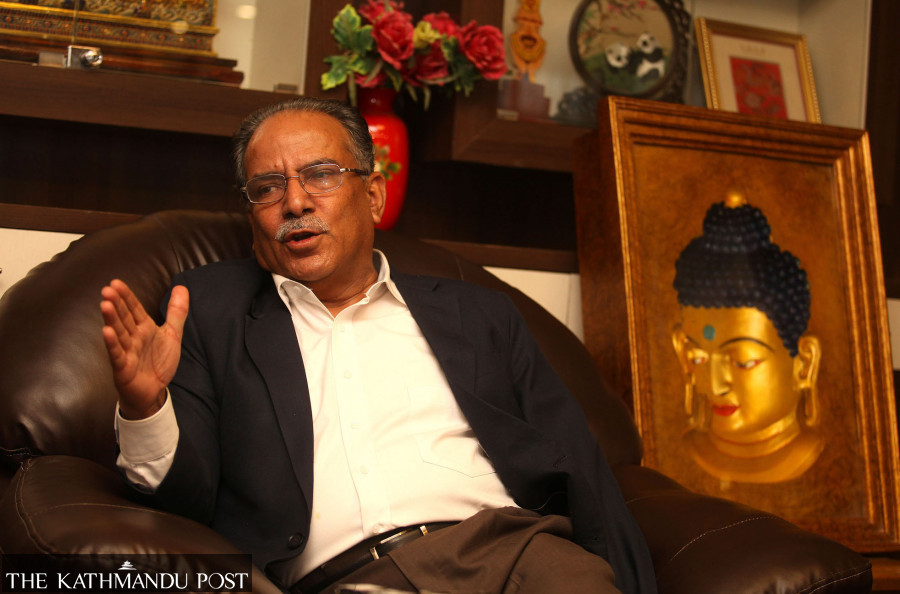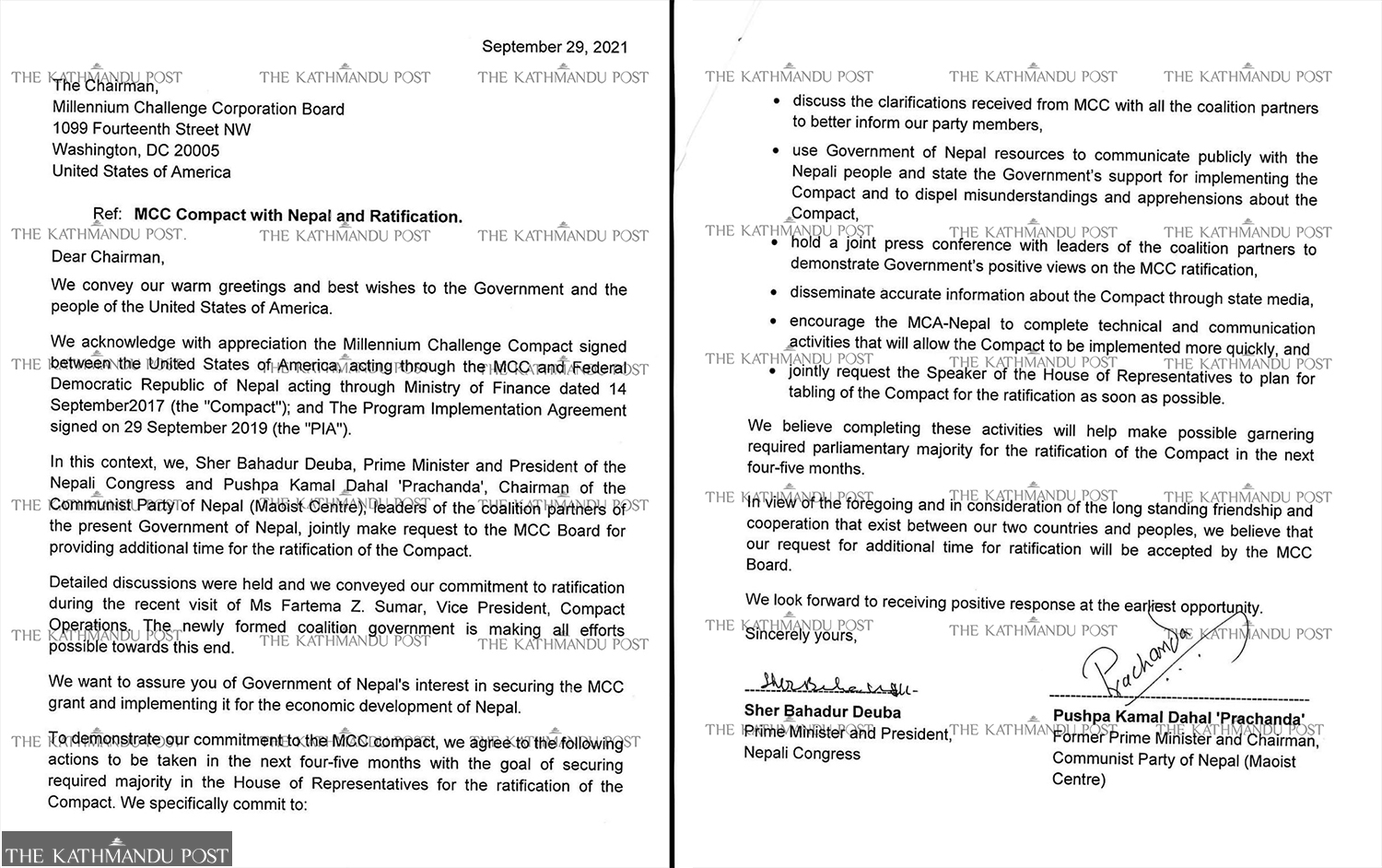Politics
Dahal’s mendacity, double-dealing and subterfuge
How two letters exposed the Maoist chair’s political shenanigans using the MCC compact.
Binod Ghimire
In his political dossier presented in the eighth general convention of the Communist Party of Nepal (Maoist Centre) in December, the party’s chairperson Pushpa Kamal Dahal had said the Millennium Challenge Corporation-Nepal Compact will not be endorsed without amendments to some of its provisions.
Some representatives of the convention had called for scrapping it altogether. However, the dossier was endorsed unopposed after Dahal assured that the party will not stand for the MCC-Nepal Compact as long as it contains the provisions that are against the national interest.
It was the time when Dahal was denying a statement made by Prime Minister Sher Bahadur Deuba that they had sent a letter to MCC assuring its ratification.
Just on Thursday, during a virtual orientation to leaders and cadres of Karnali Province, Dahal reiterated that the MCC-Nepal Compact will not be endorsed “in its present form.” He said that it cannot be endorsed unless there is an assurance that it doesn’t affect the national interest.
“I urge you to get focused on election activities clearing the rumours about the party’s position on MCC,” he said.
Of late, Deuba’s plan to table the compact in Parliament met with fierce opposition from Dahal. The $500 million American grant was threatening the coalition.
On Sunday, the Post and its sister paper Kantipur reported that Deuba and Dahal had sent a letter on September 29 last year seeking four-five months to build consensus among coalition partners to ratify the compact. Fatema Z Sumar, vice-president of the MCC’s Department of Compact Operations, said in an interview that MCC set a deadline of February 28 for the compact ratification as per the request from Deuba and Dahal as on that day the five-month period concludes. She said that MCC has already sent a response letter to the two leaders.
Then on Sunday itself, two letters—one sent by Deuba and Dahal and the other, MCC’s response—let the cat out of the bag.
Dahal’s subterfuge became known to all.
Observers say the Maoist leader was clearly doing a double-dealing. After weaponising the MCC compact against his then co-chair KP Sharma Oli, Dahal was pandering to his party members, while also appeasing the Americans, according to them.
“He has been trapped,” Rajendra Maharjan, a political commentator, told the Post. “Dahal—and only him—is responsible for the situation he is in now.”
According to Maharjan, the Maoist leader has an uncanny tendency to play such double games and keep even the top party leadership in the dark.
The letter Deuba and Dahal sent jointly to MCC clearly says that they will work to ratify the compact, unlike the Maoist leader’s assertions that the missive was about seeking some time for building consensus and that it did not give assurances of the compact’s ratification.
According to the letter, a copy of which the Post also has obtained, the two leaders requested additional time for the ratification of the MCC-Nepal Compact.

Deuba and Dahal have in the letter said that they would discuss the clarifications received from MCC with all the coalition partners to better inform their party members; use government resources to communicate publicly with the Nepali people and state the government’s support for implementing the compact and to dispel misunderstandings and apprehensions about the compact; hold a joint press conference with leaders of the coalition partners to demonstrate government’s positive views on the MCC compact’s ratification and disseminate accurate information about the compact through state media.
The letter nowhere talks about amendments to the MCC provisions.
The joint letter was dispatched on September 29, two months before the Maoist Centre’s general convention. But the 1,631 representatives attending the general convention were kept in the dark.
In the letter, Deuba and Dahal have also expressed their commitment to encourage the MCA-Nepal to complete technical and communication activities that will allow the compact to be implemented more quickly, and jointly request the Speaker of the House of Representatives to plan for tabling of the compact for ratification as soon as possible.
The response letter from MCC to Deuba and Dahal has in clear terms said that it expects the leaders to work in line with their commitments.
“The MCC Board noted your commitment in the September 21 letter to work to ratify the compact in four-five months from the date of the letter. The Board also acknowledged your plan to increase public awareness of the compact and actively combat disinformation about the compact,” reads the letter undersigned by Mahmoud Bah, acting chief executive officer of MCC. “MCC requests that you continue to work with parliamentarians and coalition partners to ratify the compact by the timeline indicated in your letter, no later than February 28, 2022.”
Sumar told the Post on Friday that the five-month time sought by Deuba and Dahal ends on February 28.
A response letter sent by MCC to Deuba and Dahal says: “Without action on your part by February 28, 2022, the MCC Board will discuss next steps at its March 2022 meeting, including whether to continue with the compact.”
“Absent ratification, it is within the MCC Board’s authority to discontinue Nepal’s eligibility to receive the $500 million compact grant from the United States,” reads the letter from MCC. “Such a decision would end MCC’s partnership with Nepal.”

Bah in his letter to the Nepali leaders has also reminded them of their commitments to ratify the compact.
Those who have followed the developments say Dahal clearly did a double-dealing and that he might have thought the letter would not become a public property so soon.
After the letter came to the public domain, Dahal activated his secretariat to justify why he and Prime Minister Deuba sent the letter to MCC.
According to a statement issued by Dahal’s secretariat, the letter was written to buy time as the government needed to build national consensus on the MCC compact.
“The letter was written in the national interest… and to protect the alliance and the government as prime minister of the newly formed government was under pressure to ratify the MCC compact,” reads the statement. “The diplomatic initiative taken for the protection of the national interest shouldn’t be taken otherwise.”
Dahal in the statement has said that the party’s position remains as firm as it was that the MCC-Nepal Compact cannot be endorsed in the present form.
Some Maoist Centre leaders believe that it was wrong on the part of the prime minister and their party chair to write to MCC.
Dev Gurung, the party’s chief whip, said Deuba and Dahal didn't even maintain the minimum diplomatic protocol in sending the letter.
“A sitting and a former prime minister have sent a letter which could have been done by a finance secretary, if there was such a need,” Gurung told the Post. “Their act cannot be justified.”
Regardless of the letter and its content, said Gurung, the Maoist Centre is against the ratification of the compact without any amendments to the provisions that undermine Nepal’s sovereignty.
Observers say since it was Dahal who instilled a radical view against MCC in his party, it is for him to now deal with that. It is not easy for him to stand for its ratification, according to them.
But backtracking on his commitment would further erode his credibility.
“Dahal’s stature has been gradually declining over the years for such reasons,” Bipin Adhikari, a professor and a former dean at Kathmandu University School of Law, told the Post. “His double game has been exposed.”
There is no clarity on how the current coalition will move forward. Some Maoist leaders have said their party won’t remain in the coalition if Deuba tries to press for the compact’s ratification. The question, however, is about Dahal’s hypocrisy.
After Dahal resisted to the compact’s ratification, the government on December 19 had formed a task force led by CPN (Unified Socialist) leader Jhala Nath Khanal, with Narayan Kaji Shrestha, a Maoist leader, and Gyanendra Karki, communication minister in the current government, as members.
While Khanal and Shrestha are known opposers of the compact’s ratification, Karki was the one who signed the compact in September 2017 as then finance minister. The task force became irrelevant after members failed to arrive at any conclusion.
Daman Nath Dhungana, a former Speaker and a civil society member, said there seems to have been an ulterior motive from the very beginning from some sections in the ruling coalition.
“How long does it take to study an agreement anyway?” said Dhungana. “It has become apparent that it was just a technique to prolong the process with the hidden interest not to ratify it.”




 8.79°C Kathmandu
8.79°C Kathmandu














